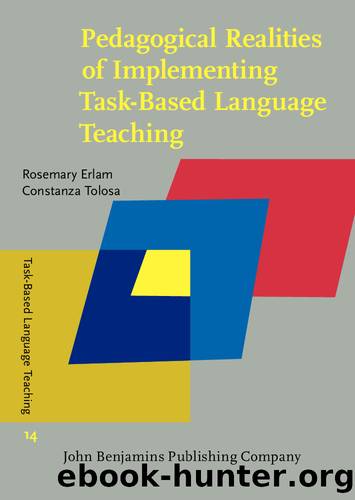Pedagogical Realities of Implementing Task-Based Language Teaching by Rosemary Erlam & Constanza Tolosa

Author:Rosemary Erlam & Constanza Tolosa [Erlam, Rosemary & Tolosa, Constanza]
Language: eng
Format: epub
Publisher: John Benjamins Publishing Company
Published: 2022-01-13T00:00:00+00:00
Students reported enjoying the following aspects of this lesson (see Table 28) that could, possibly, be related to the task they completed:
Table 28.Student affective responses to Task 2
Students reported enjoying No. of âlikesâ
Having a conversation 4
Interacting/working with friends/classmates 4
The overall satisfaction with this lesson, reported on a scale of 1 to 5, was 3.9.
What we would conclude from Taniaâs two lessons containing Tasks 1 and 2
In these lessons, there was evidence of an approach typical of focus on formS in that much of the language use (especially in Task 1) was prescribed, preselected and even formulaic. At the same time, within this context where students were attending to and using particular language formS, they were also attending to meaning. This was particularly the case during the conversation (Task 2), where learners had the chance to encode and decode messages and opinions that were personal and true for them and their peers. However, this was also the case during Task 1, where even although the language that students used to classify sports could appear to be formulaic, the built-in cognitive challenge of reasoning and sorting these sports required a focus on meaning.
The information that students gave about their learning, furthermore, indicated attention to both language forms and meaning. Some students gave examples of language structures they had learnt, while others (e.g., in Task 2) reported âlearning about each other,â indicating that for some there were language, and for others, communicative outcomes. Interestingly, some students reported learning from, and enjoying, parts of the lessons that were not task-like and where there was a definite focus on language as an object, in particular, the memorisation of katakana characters.
These students had not been learning Japanese for a full year (the previous year they had had 6 months only), and they were timetabled for only 4 hours of classes a week. Taking account of these factors, it is, perhaps, difficult to imagine students working at tasks where the language use was significantly less prescribed and preselected than it was. However, even when the use of language tended to be formulaic, we found, as in Van den Branden (2009), the kind of interactions likely to promote language learning: negotiation of meaning, recasts, explicit metalinguistic information, clarification of meaning, pushed output and scaffolding. There were opportunities for learners to use language as a tool and construct form-meaning-function relationships. Furthermore, as already documented, we found these learning opportunities both in the context of more prescribed, and less predictable language use.
There was a high level of student engagement during both lessons. Evidence of this was the noise as students engaged in interaction. In both lessons, learners reported a high level of enjoyment. A number of students gave, as a reason for rating these lessons highly, the fact that they enjoyed working with each other and having conversations.
The teacher had a role as facilitator during both lessons, organising and motivating students to complete the task. However, arguably her role as conversational partner was the most important. She provided corrective feedback,
Download
This site does not store any files on its server. We only index and link to content provided by other sites. Please contact the content providers to delete copyright contents if any and email us, we'll remove relevant links or contents immediately.
Housekeeping by Marilynne Robinson(4347)
Papillon (English) by Henri Charrière(4195)
The Poetry of Pablo Neruda by Pablo Neruda(4039)
World without end by Ken Follett(3428)
TCP IP by Todd Lammle(3134)
Fluent Forever: How to Learn Any Language Fast and Never Forget It by Gabriel Wyner(3028)
The Rape Of Nanking by Iris Chang(2774)
How Proust Can Change Your Life by Alain De Botton(2742)
The Alchemist by Paulo Coelho(2644)
The Partner by John Grisham(2346)
Two lives by Helen Naylor(2270)
Hitler by Ian Kershaw(2152)
Yerma by Federico García Lorca(2016)
Sophie's World by Jostein Gaarder(1968)
Smilla's Sense of Snow by Peter Hoeg(1905)
Merriam-Webster's Pocket Dictionary by Merriam-Webster(1882)
Twilight of Idols and Anti-Christ by Friedrich Nietzsche(1850)
Il cavaliere inesistente by Italo Calvino(1825)
Deep Writing by Eric Maisel(1784)
